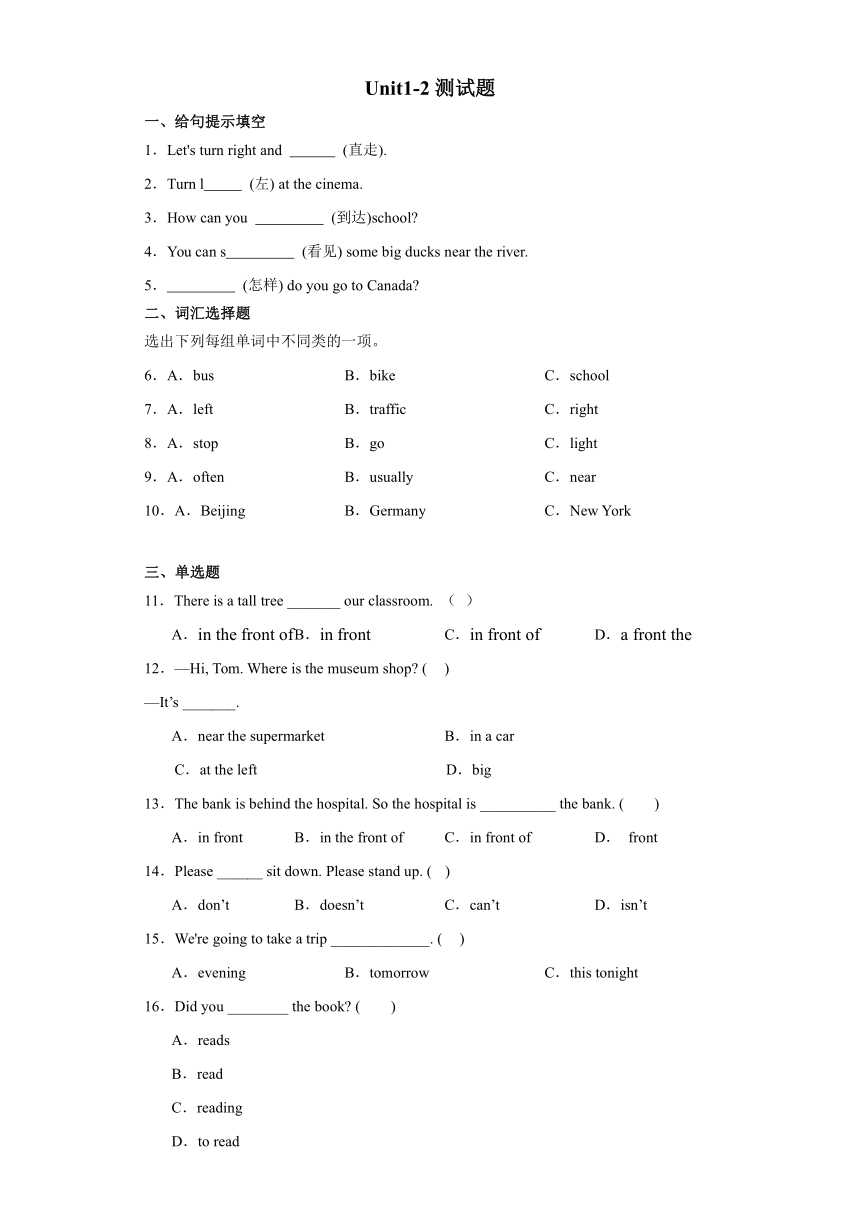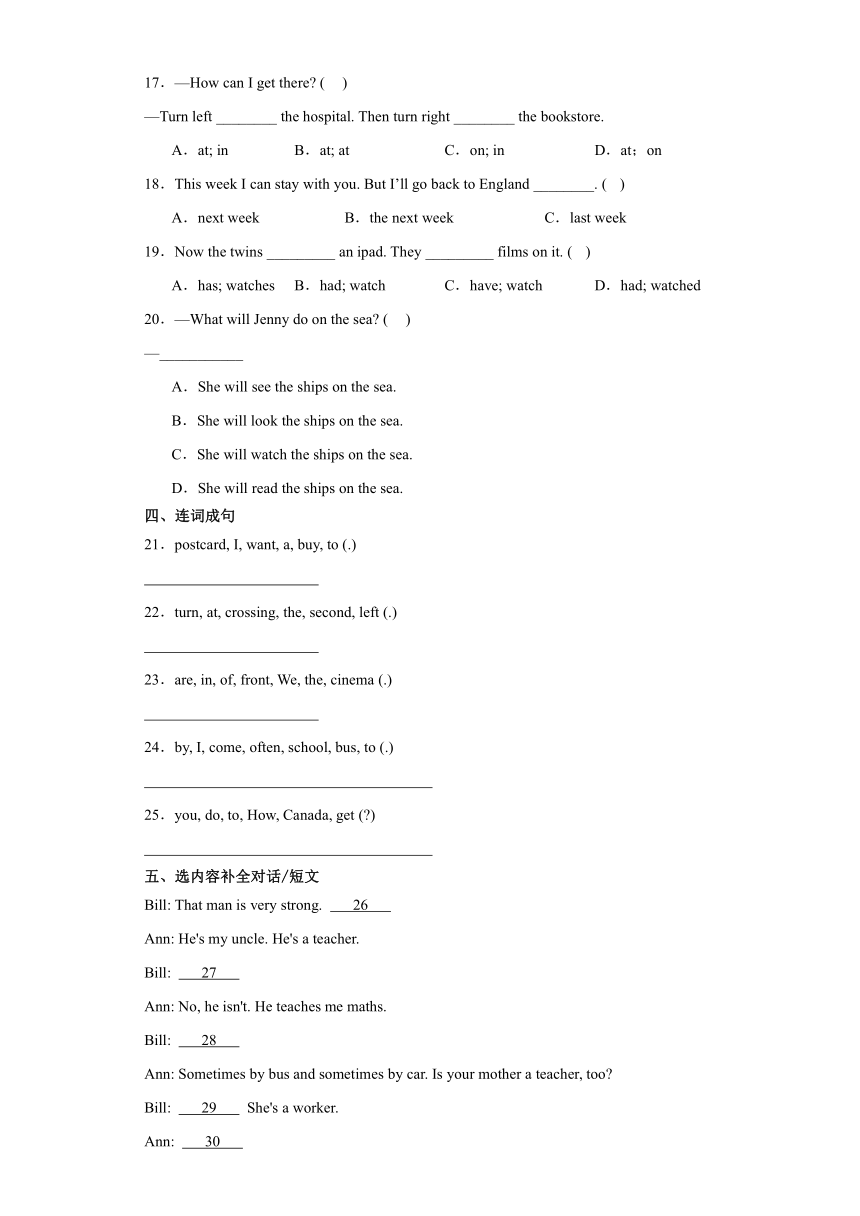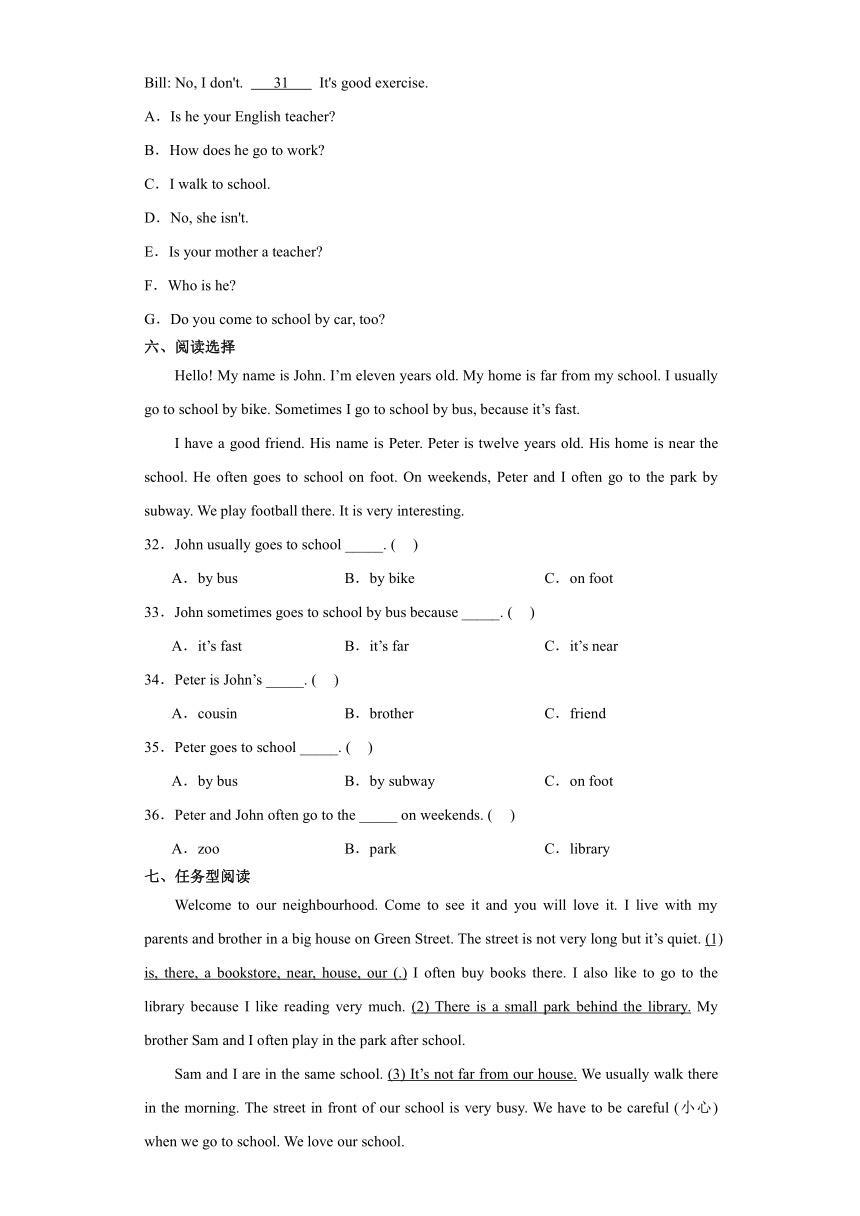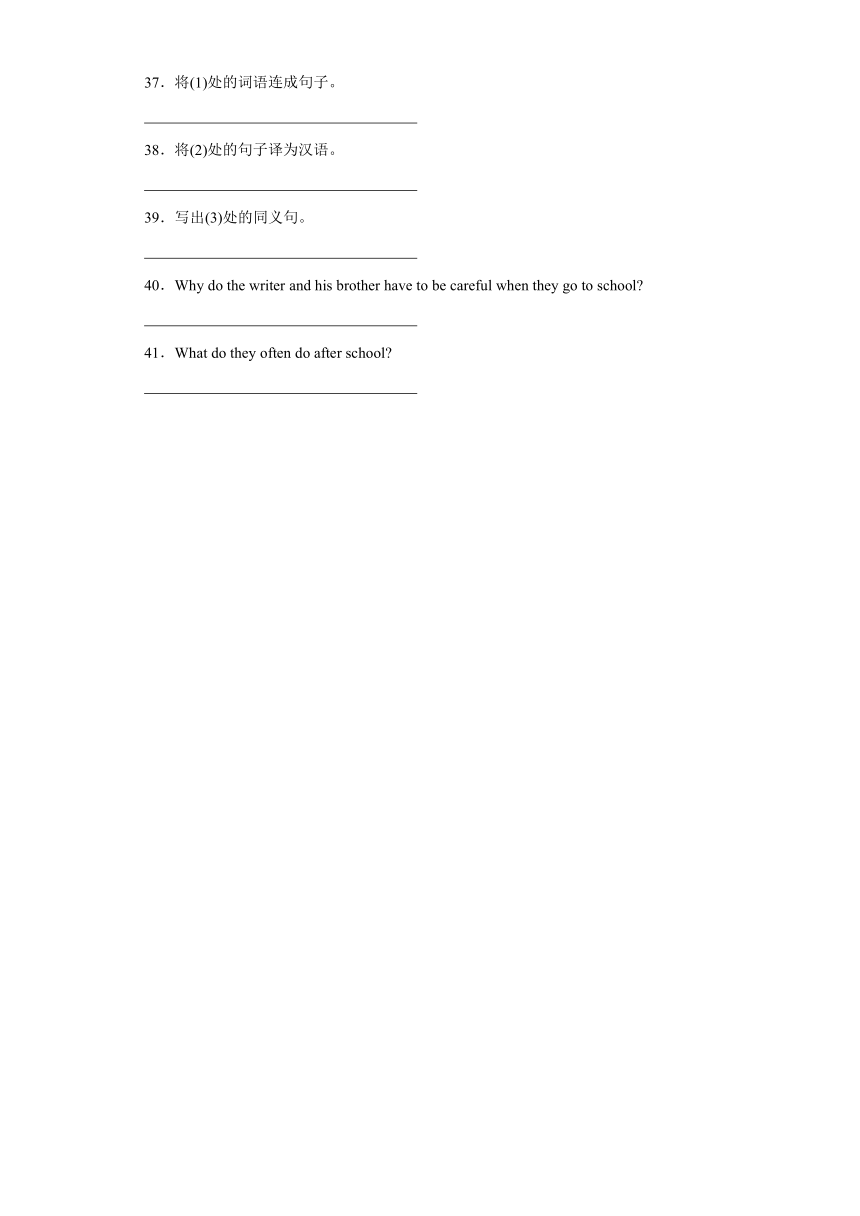人教版(PEP)六年级上册 Unit 1-2 单元卷(含答案)
文档属性
| 名称 | 人教版(PEP)六年级上册 Unit 1-2 单元卷(含答案) |  | |
| 格式 | docx | ||
| 文件大小 | 26.4KB | ||
| 资源类型 | 教案 | ||
| 版本资源 | 人教版(PEP) | ||
| 科目 | 英语 | ||
| 更新时间 | 2023-09-27 19:37:22 | ||
图片预览




文档简介
Unit1-2测试题
一、给句提示填空
1.Let's turn right and (直走).
2.Turn l (左) at the cinema.
3.How can you (到达)school
4.You can s (看见) some big ducks near the river.
5. (怎样) do you go to Canada
二、词汇选择题
选出下列每组单词中不同类的一项。
6.A.bus B.bike C.school
7.A.left B.traffic C.right
8.A.stop B.go C.light
9.A.often B.usually C.near
10.A.Beijing B.Germany C.New York
三、单选题
11.There is a tall tree _______ our classroom. ( )
A.in the front of B.in front C.in front of D.a front the
12.—Hi, Tom. Where is the museum shop ( )
—It’s _______.
near the supermarket B.in a car
C.at the left D.big
13.The bank is behind the hospital. So the hospital is __________ the bank. ( )
A.in front B.in the front of C.in front of D. front
14.Please ______ sit down. Please stand up. ( )
A.don’t B.doesn’t C.can’t D.isn’t
15.We're going to take a trip _____________. ( )
A.evening B.tomorrow C.this tonight
16.Did you ________ the book ( )
A.reads
B.read
C.reading
D.to read
17.—How can I get there ( )
—Turn left ________ the hospital. Then turn right ________ the bookstore.
A.at; in B.at; at C.on; in D.at;on
18.This week I can stay with you. But I’ll go back to England ________. ( )
A.next week B.the next week C.last week
19.Now the twins _________ an ipad. They _________ films on it. ( )
A.has; watches B.had; watch C.have; watch D.had; watched
20.—What will Jenny do on the sea ( )
—___________
A.She will see the ships on the sea.
B.She will look the ships on the sea.
C.She will watch the ships on the sea.
D.She will read the ships on the sea.
四、连词成句
21.postcard, I, want, a, buy, to (.)
22.turn, at, crossing, the, second, left (.)
23.are, in, of, front, We, the, cinema (.)
24.by, I, come, often, school, bus, to (.)
25.you, do, to, How, Canada, get ( )
五、选内容补全对话/短文
Bill: That man is very strong. 26
Ann: He's my uncle. He's a teacher.
Bill: 27
Ann: No, he isn't. He teaches me maths.
Bill: 28
Ann: Sometimes by bus and sometimes by car. Is your mother a teacher, too
Bill: 29 She's a worker.
Ann: 30
Bill: No, I don't. 31 It's good exercise.
A.Is he your English teacher
B.How does he go to work
C.I walk to school.
D.No, she isn't.
E.Is your mother a teacher
F.Who is he
G.Do you come to school by car, too
六、阅读选择
Hello! My name is John. I’m eleven years old. My home is far from my school. I usually go to school by bike. Sometimes I go to school by bus, because it’s fast.
I have a good friend. His name is Peter. Peter is twelve years old. His home is near the school. He often goes to school on foot. On weekends, Peter and I often go to the park by subway. We play football there. It is very interesting.
32.John usually goes to school _____. ( )
A.by bus B.by bike C.on foot
33.John sometimes goes to school by bus because _____. ( )
A.it’s fast B.it’s far C.it’s near
34.Peter is John’s _____. ( )
A.cousin B.brother C.friend
35.Peter goes to school _____. ( )
A.by bus B.by subway C.on foot
36.Peter and John often go to the _____ on weekends. ( )
A.zoo B.park C.library
七、任务型阅读
Welcome to our e to see it and you will love it. I live with my parents and brother in a big house on Green Street. The street is not very long but it’s quiet. (1) is, there, a bookstore, near, house, our (.) I often buy books there. I also like to go to the library because I like reading very much. (2) There is a small park behind the library. My brother Sam and I often play in the park after school.
Sam and I are in the same school. (3) It’s not far from our house. We usually walk there in the morning. The street in front of our school is very busy. We have to be careful (小心) when we go to school. We love our school.
37.将(1)处的词语连成句子。
38.将(2)处的句子译为汉语。
39.写出(3)处的同义句。
40.Why do the writer and his brother have to be careful when they go to school
41.What do they often do after school
参考答案:
1.go straight
2.left/eft
3.get to
4.see/ee
5.How
6.C 7.B 8.C 9.C 10.B
11.C
in front of表示“在某物 (外部) 的前面”,而in the front of则表示“在某物 (内部) 的前面”。由常识可知树一般是种在教室外面的。故选C。
12.A
A超市附近;B小汽车里;C在左边,at the left of+具体地点;D大的。BD不符合逻辑。故选A。
13.C
本题考查介词短语,在……前面(外部)in front of;在……前面(内部)in the front of。故选C。
14.A
本题考查祈使句的否定形式,Please+don’t+动词原形+其他。故选A。
15.B
A晚上,不能单独放在句末;B明天,一般将来时的标志词;C中的tonight单独使用,表示在今晚。B选项符合题意,故选B。
16.B
did是助动词,后跟动词原形,reads是动词的第三人称单数,read是动词原形,故选B。
17.B
然后在书店处右转。本题考查介词的固定用法,在……处转弯用介词at,故选B。
18.A
本题考查时间状语,A表示“下周”,常用于一般将来时中;B表示特指的“第二周”,常用于一般过去时中;C上周,用于一般过去时;该句是一般将来时。故选A。
19.C
他们在上面看电影。由now可知句子是一般现在时,主语twins是名词复数形式,谓语动词用动词原形,主语They是第三人称复数,谓语动词用动词原形,所以C选项符合题意,故选C。
20.C
see表示看的结果,look是不及物动词,watch通常指仔细地盯着看事物的变化,read表示阅读书籍,选项C符合题意,故选C。
21.I want to buy a postcard.
postcard明信片,I我,want想要,a一张,buy买,to动词不定式符号,根据所给的句号,可知句子是一个陈述句,根据所给词义可以连成句子:我想买一张明信片。故答案为I want to buy a postcard.
22.Turn left at the second crossing.
turn left左转,at the second crossing在第二个十字路口,根据所给的句号及动词原形turn,可知句子是一个祈使句,根据所给词义可以连成句子:在第二个十字路口向左转。故答案为Turn left at the second crossing.
23.We are in front of the cinema./We’re in front of the cinema.
are是, in front of在……前面,we我们,the cinema电影院,根据所给句号,可知句子是陈述句,根据词义连成句子:我们在电影院前面。故答案为We are in front of the cinema.或者We’re in front of the cinema.
24.I often come to school by bus.
by bus乘公共汽车,I我,come to school来学校,often经常,根据所给句号和单词,可知句子是陈述句,根据词义连成句子:我经常乘公共汽车来学校。故答案为I often come to school by bus.
25.How do you get to Canada
you你(们),do助动词,get to到达,How怎样,Canada加拿大,根据所给问号,可知句子是疑问句,根据词义连成句子:你(们)怎么去加拿大?故答案为How do you get to Canada
26.F 27.A 28.B 29.D 30.G 31.C
26.根据答语:他是我的叔叔。可知问句询问他是谁?F选项他是谁?符合语境,故选F。
27.根据答语:不,他不是。他教数学。可知问句为一般疑问句,A选项他是你的英语老师吗?符合语境,故选A。
28.根据答语:有时乘公共汽车,有时开车。可知问句询问交通方式。B选项他怎样去上班?符合语境,故选B。
29.根据问句:你的妈妈也是一位老师吗?一般疑问句用yes或no回答。可知D选项不,她不是。符合语境,故选D。
30.根据答语:不,我不是。可知问句为一般疑问句,G选项你也开车来学校吗?符合语境,故选G。
31.根据横线后:这是很好的锻炼。可知C选项我步行去学校,符合语境,故选C。
32.B 33.A 34.C 35.C 36.B
32.句意:约翰通常_____去上学。A乘公共汽车,B骑自行车,C步行,根据“I usually go to school by bike.”,可知约翰通常骑自行车去上学,故选B。
33.句意:约翰有时乘公共汽车去上学因为_______。A它很快,B它很远,C它很近,根据“Sometimes I go to school by bus, because it’s fast.”,可知约翰有时乘公共汽车去上学是因为公共汽车很快,故选A。
34.句意:彼得是约翰的______。A堂弟,B哥哥/弟弟,C朋友,根据“I have a good friend. His name is Peter.”,可知彼得是约翰的朋友,故选C。
35.句意:彼得_____去上学。A乘公共汽车,B乘地铁,C步行,根据“He often goes to school on foot.”,可知彼得步行去上学,故选C。
36.句意:彼得和约翰周末经常去_______。A动物园,B公园,C图书馆,根据“On weekends, Peter and I often go to the park by subway.”,可知彼得和约翰周末经常去公园,故选B。
37.There is a bookstore near our house. 38.图书馆后面有个小公园。 39.It’s near our house. 40.Because the street in front of their school is very busy. 41.They often play in the park after school.
37.there is有,a一家,bookstore书店,near在……附近,house房子,our我们的,根据所给句号和单词,可知句子是there be句型,根据词义连成句子:我们家附近有一家书店。故答案为There is a bookstore near our house.
38.There is有,a一个,small小的,park公园,behind the library图书馆后面,句子是there be句型,故答案为图书馆后面有个小公园。
39.句意:它离我们家不远。题干要求写同义句,not far from可替换为near,故答案为It’s near our house.
40.句意:为什么作者和他的弟弟上学时必须小心?根据“The street in front of our school is very busy. We have to be careful (小心) when we go to school.”,可知因为学校前面的街道很繁忙,故答案为Because the street in front of their school is very busy.
41.句意:他们放学后经常做什么?根据“My brother Sam and I often play in the park after school.”,可知他们放学后经常在公园里玩,故答案为They often play in the park after school.
一、给句提示填空
1.Let's turn right and (直走).
2.Turn l (左) at the cinema.
3.How can you (到达)school
4.You can s (看见) some big ducks near the river.
5. (怎样) do you go to Canada
二、词汇选择题
选出下列每组单词中不同类的一项。
6.A.bus B.bike C.school
7.A.left B.traffic C.right
8.A.stop B.go C.light
9.A.often B.usually C.near
10.A.Beijing B.Germany C.New York
三、单选题
11.There is a tall tree _______ our classroom. ( )
A.in the front of B.in front C.in front of D.a front the
12.—Hi, Tom. Where is the museum shop ( )
—It’s _______.
near the supermarket B.in a car
C.at the left D.big
13.The bank is behind the hospital. So the hospital is __________ the bank. ( )
A.in front B.in the front of C.in front of D. front
14.Please ______ sit down. Please stand up. ( )
A.don’t B.doesn’t C.can’t D.isn’t
15.We're going to take a trip _____________. ( )
A.evening B.tomorrow C.this tonight
16.Did you ________ the book ( )
A.reads
B.read
C.reading
D.to read
17.—How can I get there ( )
—Turn left ________ the hospital. Then turn right ________ the bookstore.
A.at; in B.at; at C.on; in D.at;on
18.This week I can stay with you. But I’ll go back to England ________. ( )
A.next week B.the next week C.last week
19.Now the twins _________ an ipad. They _________ films on it. ( )
A.has; watches B.had; watch C.have; watch D.had; watched
20.—What will Jenny do on the sea ( )
—___________
A.She will see the ships on the sea.
B.She will look the ships on the sea.
C.She will watch the ships on the sea.
D.She will read the ships on the sea.
四、连词成句
21.postcard, I, want, a, buy, to (.)
22.turn, at, crossing, the, second, left (.)
23.are, in, of, front, We, the, cinema (.)
24.by, I, come, often, school, bus, to (.)
25.you, do, to, How, Canada, get ( )
五、选内容补全对话/短文
Bill: That man is very strong. 26
Ann: He's my uncle. He's a teacher.
Bill: 27
Ann: No, he isn't. He teaches me maths.
Bill: 28
Ann: Sometimes by bus and sometimes by car. Is your mother a teacher, too
Bill: 29 She's a worker.
Ann: 30
Bill: No, I don't. 31 It's good exercise.
A.Is he your English teacher
B.How does he go to work
C.I walk to school.
D.No, she isn't.
E.Is your mother a teacher
F.Who is he
G.Do you come to school by car, too
六、阅读选择
Hello! My name is John. I’m eleven years old. My home is far from my school. I usually go to school by bike. Sometimes I go to school by bus, because it’s fast.
I have a good friend. His name is Peter. Peter is twelve years old. His home is near the school. He often goes to school on foot. On weekends, Peter and I often go to the park by subway. We play football there. It is very interesting.
32.John usually goes to school _____. ( )
A.by bus B.by bike C.on foot
33.John sometimes goes to school by bus because _____. ( )
A.it’s fast B.it’s far C.it’s near
34.Peter is John’s _____. ( )
A.cousin B.brother C.friend
35.Peter goes to school _____. ( )
A.by bus B.by subway C.on foot
36.Peter and John often go to the _____ on weekends. ( )
A.zoo B.park C.library
七、任务型阅读
Welcome to our e to see it and you will love it. I live with my parents and brother in a big house on Green Street. The street is not very long but it’s quiet. (1) is, there, a bookstore, near, house, our (.) I often buy books there. I also like to go to the library because I like reading very much. (2) There is a small park behind the library. My brother Sam and I often play in the park after school.
Sam and I are in the same school. (3) It’s not far from our house. We usually walk there in the morning. The street in front of our school is very busy. We have to be careful (小心) when we go to school. We love our school.
37.将(1)处的词语连成句子。
38.将(2)处的句子译为汉语。
39.写出(3)处的同义句。
40.Why do the writer and his brother have to be careful when they go to school
41.What do they often do after school
参考答案:
1.go straight
2.left/eft
3.get to
4.see/ee
5.How
6.C 7.B 8.C 9.C 10.B
11.C
in front of表示“在某物 (外部) 的前面”,而in the front of则表示“在某物 (内部) 的前面”。由常识可知树一般是种在教室外面的。故选C。
12.A
A超市附近;B小汽车里;C在左边,at the left of+具体地点;D大的。BD不符合逻辑。故选A。
13.C
本题考查介词短语,在……前面(外部)in front of;在……前面(内部)in the front of。故选C。
14.A
本题考查祈使句的否定形式,Please+don’t+动词原形+其他。故选A。
15.B
A晚上,不能单独放在句末;B明天,一般将来时的标志词;C中的tonight单独使用,表示在今晚。B选项符合题意,故选B。
16.B
did是助动词,后跟动词原形,reads是动词的第三人称单数,read是动词原形,故选B。
17.B
然后在书店处右转。本题考查介词的固定用法,在……处转弯用介词at,故选B。
18.A
本题考查时间状语,A表示“下周”,常用于一般将来时中;B表示特指的“第二周”,常用于一般过去时中;C上周,用于一般过去时;该句是一般将来时。故选A。
19.C
他们在上面看电影。由now可知句子是一般现在时,主语twins是名词复数形式,谓语动词用动词原形,主语They是第三人称复数,谓语动词用动词原形,所以C选项符合题意,故选C。
20.C
see表示看的结果,look是不及物动词,watch通常指仔细地盯着看事物的变化,read表示阅读书籍,选项C符合题意,故选C。
21.I want to buy a postcard.
postcard明信片,I我,want想要,a一张,buy买,to动词不定式符号,根据所给的句号,可知句子是一个陈述句,根据所给词义可以连成句子:我想买一张明信片。故答案为I want to buy a postcard.
22.Turn left at the second crossing.
turn left左转,at the second crossing在第二个十字路口,根据所给的句号及动词原形turn,可知句子是一个祈使句,根据所给词义可以连成句子:在第二个十字路口向左转。故答案为Turn left at the second crossing.
23.We are in front of the cinema./We’re in front of the cinema.
are是, in front of在……前面,we我们,the cinema电影院,根据所给句号,可知句子是陈述句,根据词义连成句子:我们在电影院前面。故答案为We are in front of the cinema.或者We’re in front of the cinema.
24.I often come to school by bus.
by bus乘公共汽车,I我,come to school来学校,often经常,根据所给句号和单词,可知句子是陈述句,根据词义连成句子:我经常乘公共汽车来学校。故答案为I often come to school by bus.
25.How do you get to Canada
you你(们),do助动词,get to到达,How怎样,Canada加拿大,根据所给问号,可知句子是疑问句,根据词义连成句子:你(们)怎么去加拿大?故答案为How do you get to Canada
26.F 27.A 28.B 29.D 30.G 31.C
26.根据答语:他是我的叔叔。可知问句询问他是谁?F选项他是谁?符合语境,故选F。
27.根据答语:不,他不是。他教数学。可知问句为一般疑问句,A选项他是你的英语老师吗?符合语境,故选A。
28.根据答语:有时乘公共汽车,有时开车。可知问句询问交通方式。B选项他怎样去上班?符合语境,故选B。
29.根据问句:你的妈妈也是一位老师吗?一般疑问句用yes或no回答。可知D选项不,她不是。符合语境,故选D。
30.根据答语:不,我不是。可知问句为一般疑问句,G选项你也开车来学校吗?符合语境,故选G。
31.根据横线后:这是很好的锻炼。可知C选项我步行去学校,符合语境,故选C。
32.B 33.A 34.C 35.C 36.B
32.句意:约翰通常_____去上学。A乘公共汽车,B骑自行车,C步行,根据“I usually go to school by bike.”,可知约翰通常骑自行车去上学,故选B。
33.句意:约翰有时乘公共汽车去上学因为_______。A它很快,B它很远,C它很近,根据“Sometimes I go to school by bus, because it’s fast.”,可知约翰有时乘公共汽车去上学是因为公共汽车很快,故选A。
34.句意:彼得是约翰的______。A堂弟,B哥哥/弟弟,C朋友,根据“I have a good friend. His name is Peter.”,可知彼得是约翰的朋友,故选C。
35.句意:彼得_____去上学。A乘公共汽车,B乘地铁,C步行,根据“He often goes to school on foot.”,可知彼得步行去上学,故选C。
36.句意:彼得和约翰周末经常去_______。A动物园,B公园,C图书馆,根据“On weekends, Peter and I often go to the park by subway.”,可知彼得和约翰周末经常去公园,故选B。
37.There is a bookstore near our house. 38.图书馆后面有个小公园。 39.It’s near our house. 40.Because the street in front of their school is very busy. 41.They often play in the park after school.
37.there is有,a一家,bookstore书店,near在……附近,house房子,our我们的,根据所给句号和单词,可知句子是there be句型,根据词义连成句子:我们家附近有一家书店。故答案为There is a bookstore near our house.
38.There is有,a一个,small小的,park公园,behind the library图书馆后面,句子是there be句型,故答案为图书馆后面有个小公园。
39.句意:它离我们家不远。题干要求写同义句,not far from可替换为near,故答案为It’s near our house.
40.句意:为什么作者和他的弟弟上学时必须小心?根据“The street in front of our school is very busy. We have to be careful (小心) when we go to school.”,可知因为学校前面的街道很繁忙,故答案为Because the street in front of their school is very busy.
41.句意:他们放学后经常做什么?根据“My brother Sam and I often play in the park after school.”,可知他们放学后经常在公园里玩,故答案为They often play in the park after school.
同课章节目录
